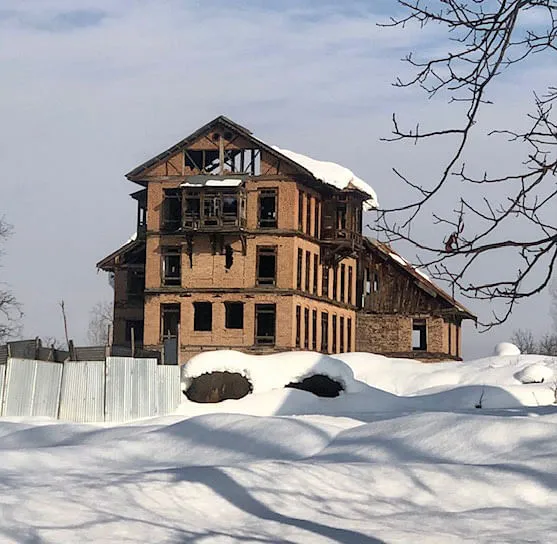Village Hawl is about 45 kms away from the city of Srinagar on the Mughal Road which comes after the village Nikas. Hawl is followed by major villages: Gabarpora and Mughalpora, the last villages of Distt Pulwama and then Keegam, Tukur, Sharmal, Arihama in the District Shopian which comes under the Pir Panjal range and signifies the end of the Kashmir valley. Mughal road connects Shopian district to Poonch and Rajouri.
Hawl of good old days in 1940s used to be a very picturesque village with beautiful view of snow-clad mountains and surrounded by several streams originating from these mountains, which would be at best 20 to 30 miles away. The village was inaccessible during winters, and also when rivulets got flooded and washed away bridges in summer. It had no medical facility, no electricity, not even toilets in homes. The village was inhabited mainly by forty families of Pandits and around 10 Muslim families.
Pandits owned the entire agricultural land while the Muslim neighbours were either artisan, washermen, potters, barbers and landless agricultural peasants who were hired for land tilling by the Pandits. Some of them also worked as domestic servants for Pandits. There was a primary school with just one teacher from the village. After primary school students had to go to Pulwama which had a middle school. Those few students who had to study further had either to go to a high school in Shopian run by Pandit teachers or go to Srinagar, which was preferred if they had some relations in the city. Very few children would study beyond middle and high school.
The village was surrounded by paddy fields and apple orchards. It had 2 temples, Bidabal, the temple of Goddess Durga, and a separate Ganesh temple. There was one mosque, near the washermen’s area near a stream and a Sufi place of worship called Siminie where Pandits and Muslims of the village used to go on specific days linked to a Sufi saint. The nearest gurudwara was in Shajimarag a predominantly Sikh village about 3 kms away very close to the forests of Yarwan. Hawl thus had a world of its own.
Pandit Prasad Joo Khan is a name which is known to everybody in Hawl even today. He came from a family of Patwaris for three generations and was a member of the Land Settlement Committee of Sir Walter Lawrence in 1889 – 1894 during Maharaja Ranjit Singh’s regimen. The surname Khan was acquired by his fore fathers who were working for Pathans in the regimen of Afghan rule in Kashmir (1747-1819). He later left this job and chose to run a store. This store would sell everything from hardware, cloth, tea leaves, herbs, common medicines, Kashmiri bread, household goods, stationery etc. It was a supermarket of the present days. Shopkeepers from neighbouring villages would also come to buy things from this shop. Prasad Joo, however, handed over the shop to his sons and took a retirement at the age of 50 years and it continued to grow till 1990.
Eminent personalities from Hawl and neighbouring areas besides Prasad Joo Khan were Pandit Janaki Nath Bhat (Maqdam), Justice Moti Lal Bhat, Prem Nath Hali, Abdul Khaliq Bhat, Educationists – Master Ram Chand and Suraj Prakash, and Prof Roop Kishan Bhat. Politicians – Ghulam Mohammed Mir Rajpori of Rajpura a minister and then speaker of Kashmir Assembly, Abdul Sattar Ranjoor a well-known leftist from Keegam, and Shamim Ahmad Shamim, a famous journalist and politician from Shopian.
Area around this village in the Pulwama district is the rice bowl and the milk supplier of the valley. People of Hawl were quite prosperous till 1990, when militancy in the valley ruined the ethos of the village. There was exodus of Hindus to Jammu and other areas in India. The village and its buildings got fossilized and the temple complex of Bidabal was taken over by armed forces to curb militancy in the area. Today it gives a very sad and desolate look. According to the present system it is located in the Rajpora Tehsil of Pulwama district. It has a gram panchayat. The total geographical area of village is 97.5 hectares. Hawl has a total population of 416 peoples with 66 houses.
Gauri Kaul Foundation has acquired a small area of land belonging to Prof Upendra Kaul, who belongs to this village, on the main Mughal Road for making the Prasad Joo Khan Memorial Healthy Heart Centre which will have Tele medicine facility. The construction work will be completed by the year end. It would be linked to the Community Health Centre, Rajpora. This smart hospital has good facilities to care for patients who need urgent attention and is very close to the village. The tele medicine centre would eventually connect to other villages of Pulwama district and districts of Shopian and Kulgam. Gauri Kaul Foundation will be running and operating this facility, with the help of people of the village. The foundation stone of this project will be laid on 14th July 2021, by the son of Late Prasad Joo Khan, Sh. Prem Nath Kaul.
Prof Upendra Kaul is Founder Director, Gauri Kaul Foundation, recipient of Dr B C Roy Award and Padma Shri.







